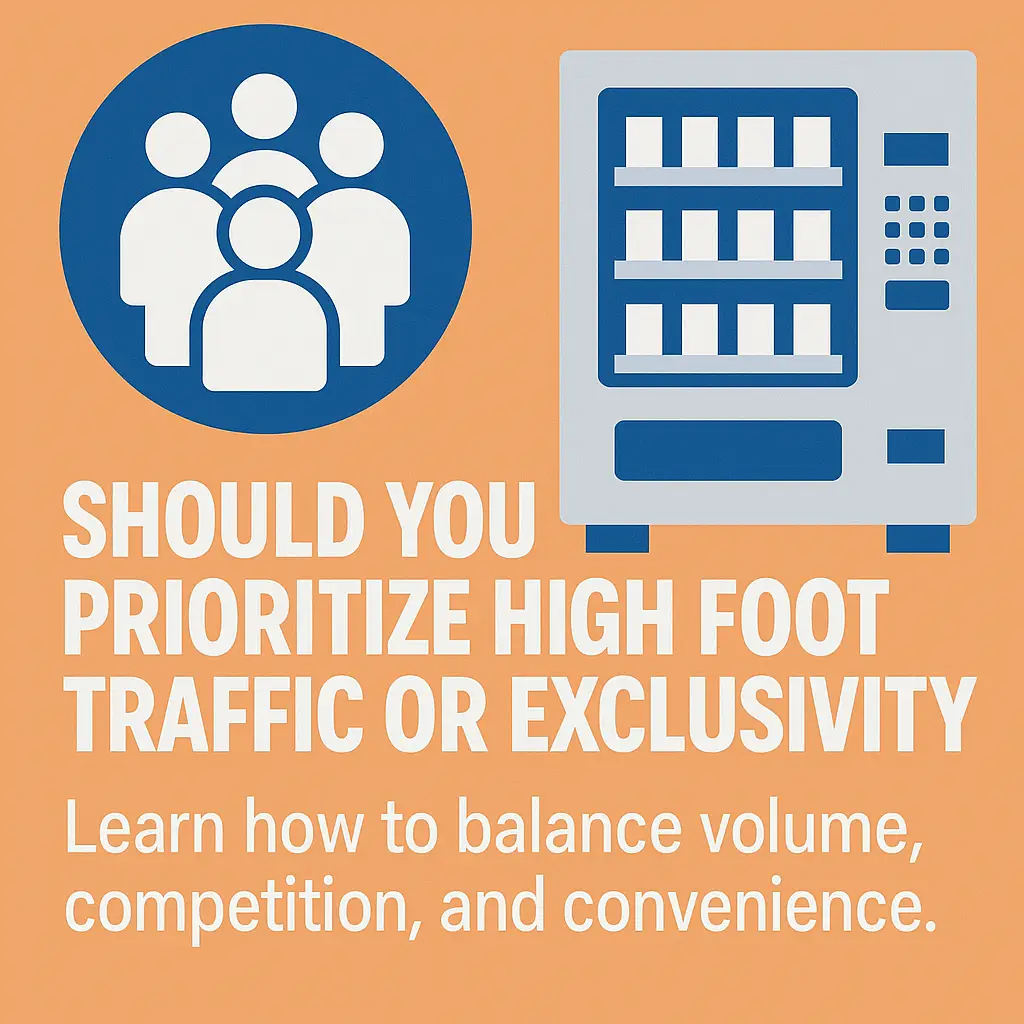High Traffic vs Low Traffic Location Strategy
Should you prioritize high foot traffic or exclusivity? Learn how to balance volume, competition, and convenience.
Back to Vending Machine Locators ResourcesShould you prioritize high foot traffic or exclusivity? Learn how to balance volume, competition, and convenience.
Back to Vending Machine Locators ResourcesStart your 30-day free trial and get instant SMS and email alerts whenever a local business needs vending service. These are real location leads to help you grow your route — you decide which ones to buy, no obligations or contracts.
![]() High-traffic spots may yield fast turnover but greater competition
High-traffic spots may yield fast turnover but greater competition
![]() Low-traffic locations offer exclusivity and stable income per user
Low-traffic locations offer exclusivity and stable income per user
![]() Assess vending needs before selecting optimal location strategy
Assess vending needs before selecting optimal location strategy
30 days free, then $39 / month.
No Commitment. Cancel Anytime.

When launching or scaling your vending machine business, deciding between high-traffic and low-traffic location strategies is critical. A high-traffic spot, such as a train station, university campus, or shopping mall, may promise larger sales volumes. However, these sites often come with stiff competition, higher operational stress, and increased risk of service issues like frequent restocking or machine damage.
By contrast, low-traffic locations—office buildings, residential complexes, or assisted living facilities—may not offer volume, but they provide exclusivity and customer loyalty. Without competing machines in sight, a consistent group of users can offer more predictable and lower-maintenance revenue streams.
The key to a successful vending strategy is evaluating your product mix and service capacity. Are you offering quick-sell items like snacks and sodas? A high-traffic venue might be better suited. If you’re introducing specialized inventory such as healthy snacks or shelf-stable meals, low-traffic sites with consistent daily use may produce better margins.
Before committing, weigh critical metrics such as vending machine visibility, ease of access, user demographics, and logistical servicing. It’s also essential to determine if you can secure exclusivity contracts in quieter locations, giving your business a long-term foothold for recurring revenue with minimal competitive interference.
Whether pursuing volume or exclusivity, diversification can balance risk. Consider piloting multiple machine types in different environments to evaluate customer behavior and identify the models with the highest ROI. Many successful vendors start with one reliable site type and expand based on actual performance rather than theoretical potential.
For more advice on optimizing your strategy, explore ways to build stable vending routes in professional environments. You can also learn the most effective expansion tactics in our guide on growing your vending business sustainably.
Vending Exchange connects vending operators with real businesses actively looking for vending services—including traditional machines, AI coolers, and office coffee. Get instant SMS and email alerts when new opportunities are available in your area. No contracts or monthly fees—just buy the leads you want. Start your free 30-day trial today and grow your vending business on your terms.
High-traffic locations offer greater sales volume and faster product turnover, making them ideal for popular snack and beverage items.
Yes, especially when they provide exclusivity and consistent daily users like office workers or residents. Lower competition can mean steadier revenue.
Not necessarily. Increased competition, higher restocking needs, and maintenance demands can cut into profits if not managed well.
Evaluate your operational capacity, product type, and ability to manage restocking. For some, exclusive access in quieter areas delivers stronger ROI.
Vandalism, machine wear, and competitive saturation are more common in public, high-foot-traffic spaces like malls and transit hubs.
Often, one or two well-stocked machines are enough. Evaluate usage after 1-2 months and scale up cautiously.
Usually, yes. Property owners in busy areas may demand higher commissions due to prime visibility and space value.
Definitely. Features like product tracking and remote monitoring reduce maintenance trips, which is ideal for quieter but steady-use environments.
Yes. Having an exclusivity agreement can ensure you're the only vendor onsite, reducing competition and increasing reliability of income.
That’s a smart move. Testing helps compare real performance, revenue consistency, and logistical challenges before scaling your vending operation.